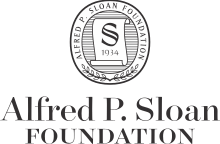Alfred P. Sloan Foundation
 | |
| Founded | 1934 |
|---|---|
| Founder | Alfred Pritchard Sloan, Jr. |
| Focus | Research and education in science, technology, engineering, mathematics and economic performance |
| Location |
|
| Method | Grantmaking |
Key people | Adam Falk (President) |
| Endowment | US$1.65 billion |
Employees | 32 |
| Website |
sloan |
The Alfred P. Sloan Foundation is an American philanthropic nonprofit organization. It was established in 1934 by Alfred P. Sloan, Jr., then-President and Chief Executive Officer of General Motors.
The Sloan Foundation makes grants to support original research and broad-based education related to science, technology, and economics. The foundation is an independent entity and has no formal relationship with General Motors.[1] As of December 31, 2011, the Sloan Foundation's assets totaled $1.65 billion.[2]
History
During the initial years of Alfred P. Sloan’s presidency, the Foundation devoted its resources almost exclusively to education in economics and business. Grants were made to develop materials to improve high school and college economics teaching; for preparation of and wide distribution of inexpensive pamphlets on the pressing economic and social issues of the day; for weekly radio airing of roundtable discussions on current topics in economics and related subjects; and for establishing a Tax Institute at the Wharton School of the University of Pennsylvania to interpret new taxes and new trends in public finance for the average citizen.
From 1936 to 1945, Harold S. Sloan, an economist who was Alfred's younger brother, served as director and vice president of the foundation.[3][4]
The Sloan Foundation also made many civic contributions to the foundation’s home city of New York, including grants to Lincoln Center for the Performing Arts, Channel 13, New York Public Library, New York University, and the Fund for the City of New York.[5]
Starting January 2018, Adam Falk, past president of Williams College, assumed the presidency of the foundation.[6]
Programs
The Alfred P. Sloan Foundation makes grants in seven broad subjects, known within the foundation as major program areas.
- Science
- Economics
- STEM Higher Education
- Digital Information Technology
- Public Understanding of Science, Technology & Economics
- Working Longer
- Energy & Environment[7]
The Sloan Work and Family Researchers Network supports research and education about work-family issues. The foundation also funded the national workplace flexibility campaign[8] as part of the Working Families program led by Kathleen E. Christensen.[9]
The Sloan Research Fellowships are annual awards given to more than 126 young researchers and university faculty, to further studies in chemistry, computational and evolutionary microbiology, computer science, economics, mathematics, neuroscience, ocean sciences and physics.[10]
In March 2008, the foundation gave a $3 million donation to the Wikimedia Foundation,[11][12][13] renewed in July 2011.
The Sloan Foundation is the primary funder of the Sloan Digital Sky Survey, a major astronomical survey that began data collection in 2000.
In 1945, the Sloan Foundation donated $4 million to launch the Sloan Kettering Cancer Institute, now the Memorial Sloan Kettering Cancer Center.[14]
In 1950, the Sloan Foundation made a gift of more than $5 million to establish a School of Industrial Management, now known as the MIT Sloan School of Management.[15]
Presidents
| Alfred P. Sloan, Jr. | 1934–1961 |
| Everett Case | 1962–1968 |
| Nils Y. Wessell[16] | 1969–1979 |
| Albert Rees[17] | 1979–1988 |
| Ralph E. Gomory | 1989–2007 |
| Paul L. Joskow | 2008–2017 |
| Adam F. Falk | 2018– |
References
- ↑ About the Sloan Foundation Archived 2012-01-03 at the Wayback Machine.
- ↑ "Wayback Machine" (PDF). 15 January 2013. Retrieved 4 January 2018.
- ↑ Staff. "Fairleigh Dickinson Elects", The New York Times, October 6, 1963. Accessed October 1, 2017.
- ↑ Staff. "Harold S. Sloan, 100, Former Manufacturer", The New York Times, November 9, 1988. Accessed October 1, 2017. "Harold Stephenson Sloan, a retired manufacturer, economist, teacher and author who was a brother of the industrialist Alfred P. Sloan, died in his sleep Saturday at his home in Lopatcong Township, N.J. He was 100 years old."
- ↑ "Alfred P. Sloan Foundation History" (PDF). Archived from the original (PDF) on 2012-01-03. Retrieved 4 January 2018.
- ↑ "Williams College President Adam Falk to step down in December". Retrieved 4 January 2018.
- ↑ "Sloan Foundaiton Website". Alfred P. Sloan Foundation. Retrieved 4 October 2018.
- ↑ "National Challenge for Higher Education: Campaign Recruiting Materials". www.acenet.edu. Retrieved 2017-01-30.
- ↑ "Kathleen E. Christensen: Program Director, Alfred P. Sloan Foundation--Sloan Center on Aging and Work at Boston College". www.bc.edu. Retrieved 2017-01-30.
- ↑ "Sloan Research Fellowships". Sloan Foundation. Retrieved 5 October 2018.
- ↑ "Press releases/Sloan Foundation Support - Wikimedia Foundation". wikimediafoundation.org. Retrieved 4 January 2018.
- ↑ Brian Bergstein. "The Associated Press: Sloan Foundation to Give Wikipedia $3M". Associated Press. Archived from the original on 29 March 2008. Retrieved 21 August 2012.
- ↑ Brian Bergstein (26 March 2008). "Sloan Foundation donates $3M to Wikipedia". USA Today. Gannett Company. Retrieved 21 August 2012.
- ↑ "Sloan Kettering Institute Marks 70 Years of Changing Cancer". MSKCC.org. Retrieved 12 October 2018.
- ↑ "About MIT Sloan". MIT. Retrieved 12 October 2018.
- ↑ Hevesi, Dennis (9 March 2007). "Nils Wessell, 92, Leader Who Transformed Tufts, Is Dead". The New York Times.
- ↑ Levy, Clifford J. (7 September 1992). "Albert Rees, 71, Labor Economist And an Adviser to President Ford". The New York Times.